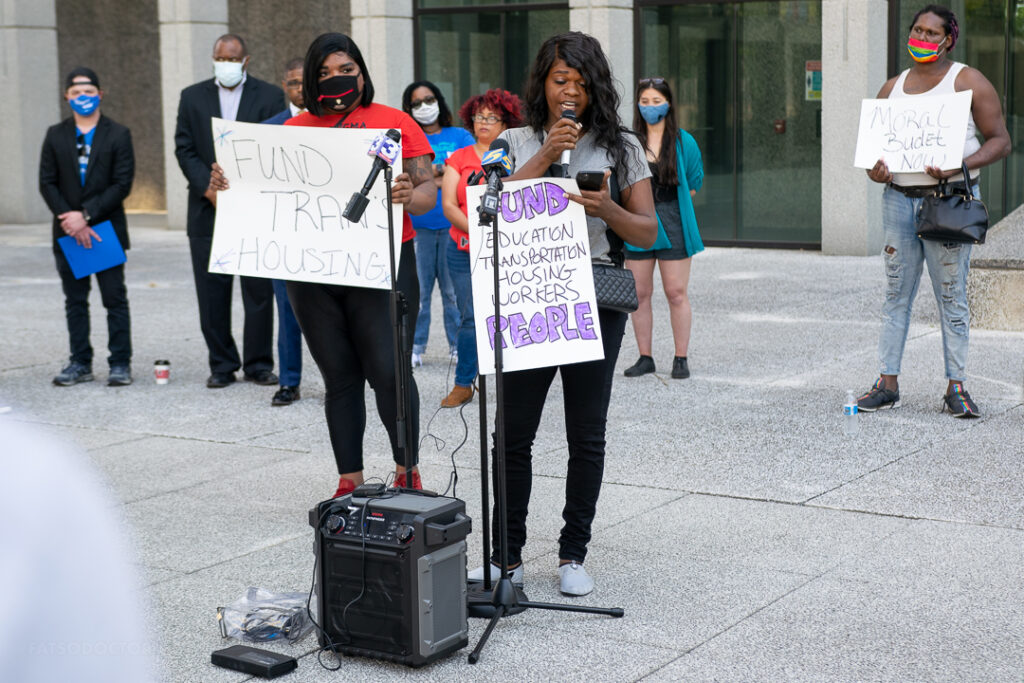Dear SCS Board Members,
Firstly, we want to recognize that the 2020-21 school year was unprecedented and we appreciate all of the hard work that the SCS Board and administration have done to adapt to the challenges of the pandemic to support our students, teachers, and schools. As the SCS Board considers how to spend ESSER dollars, we hope to be partners with you in continuing our conversations and collaboration on how we can make targeted investments in the most meaningful ways for the future prosperity of Shelby County.
We are a group of community members from MICAH, Stand for Children, ALLMemphis, Whole Child Strategies, United Parents and Students, The Memphis Lift, 90ONE (Organizing Network for Equity), and Bridge BuildersChange. We all deeply care about education equity. Over the past year, our organizations have been researching what is happening in specific areas of focus and define opportunities for improving educational opportunities for students in Shelby County. We have talked with and received feedback from SCS administrators, Board Members, County Commissioners, the County Mayor, parents, students, and community stakeholders.
As recent test data has confirmed, the COVID-19 pandemic has exacerbated inequities in Shelby County and highlighted the urgent education investment needs for our families and communities. With continuing learning loss and hardships from this past year, we know that funding our students first is more important than ever this budget cycle. That’s why during the recent budget cycle we advocated for increased funds for education and youth with campaigns for the Youth Education Success (YES) Fund and the Moral Budget. We have yet to convince our city and county governments of the increased need for investing in K-12 education success, but we pledge to keep working towards this goal in addition to state BEP advocacy.
While we were not yet successful with additional local funding, we continue to believe that the investments we recommend can have a substantial impact. With a focus on critical milestones of childhood development, our organizations have developed this list of evidence-based recommendations with proven results that will develop opportunities for increasing support and success for all students. Some of these will not be new to many of you, as we have tried to be consistent in identifying worthy solutions and to be as targeted as possible.
As SCS considers investments that the district wants to make using the opportunity from the increased ESSERdollars, we hope that you will review these priorities. We believe that all of the recommendations below align directly with your existing budget goals, SCS Destination 2025, and the Reimagining 901 plan. We look forward to working with you to ensure that SCS and its partners can deliver impactful funding with fidelity.
Improve Early Literacy Instruction and Support
Full-Time Literacy Coaches
Only one in five students in Memphis read on grade level, approximately three in four SCS third-graders are reading below grade level. Currently, there are only part-time literacy laureates in schools, which means these individuals cannot commit their full time to the rigorous needs of effective coaching. In our partnership with Dr.Nell Duke who supports us in developing early literacy policy and practice recommendations, she has emphasized the research that says literacy coaches could provide a tremendous benefit to teachers and students. Research shows the more time teachers spend directly with full-time coaches creates positive change in rapport, practice, and student achievement outcomes. Hiring dedicated full-time literacy coaches across all elementary schools would make a sustained impact by allowing more students to meet the 3rd Grade Commitment, improving Memphis literacy rates, and increasing community economic opportunities.
Multi-Tiered System of SupportsIn addition to full-time literacy coaches, we’ve also come across research from Dr. Carol Connor that is being utilized through tools from Learning Ovations by partners in other cities (such as Read Charlotte in NC). We found an opportunity that could lay out a continuum of support from school to community to home. With their short, targeted assessments, focus on indicating the needs for students in adult-managed and child-managed code and content, and clear reports, we have felt like this is a foundation of support worth exploring. We believe that the Learning Ovations A2i tool is something that SCS should explore for providing support to teachers and assistants in classrooms (quality research-based screener, grouping, individualized instruction recommendations) and that their community literacy support system could extend understanding and support for students from the school into the community. Stand for Children and Literacy Mid-South are currently leading a pilot program of Learning Ovationtools in our community with Reading Checkup and A2i After School in several of Literacy Mid-South’sOut-of-School Time network partners.
Response to Instruction and Intervention (RTI²) Curriculum and Staff
RTI² is state-mandated for public schools, but funds to implement the law are scarce. If teachers receive evidence-backed RTI² curriculum to utilize during their intervention time, data shows improved student proficiency and growth. In the highest needs schools, it is common for 80% or more of students to be in Tier III, meaning they are one, two, or more grades behind. Providing fiscal resources for RTI² would further address this overwhelming gap by enabling schools to scale up their RTI² capacity and programming to best meet the diverse needs of students in Shelby County schools. We recommend identifying research-based, data-driven intervention programming, such as ALLMemphis (Access Language & Literacy), to utilize in schools with students who have the greatest need. Local programs like ALLMemphis provide a high-quality curriculum while also investing in teacher capacity through intensive coaching, mentorship, and training on the science of reading and multi-sensory phonics instructional methods.
Increasing Mental Health Resources, Social Work, and Nurses
Hiring Nurses and Social Workers Across All SchoolsShelby County’s average ratio is 414 students to one social worker, compared to the recommended 250 to one(School Social Work of America). Shelby County’s average ratio is 1,207 students to one nurse compared to the recommended ratio of 750 to one (American Nurses Association). However, with the chronic health conditions existing in Memphis – such as diabetes, obesity, and high asthma rates – one nurse per school is recommended to have the most impact. Increasing accessibility to nurses addresses community health issues, reduces chronic absenteeism, and helps children be fully present to learn. Both locally and in the Tennessee state legislature, there is bipartisan support for additional nurses in schools as well as social workers and other support staff. The ongoing cost of these additional staff is what has prohibited reducing the ratios. As a result, there are concerted efforts to develop plans that would increase services for both the health and mental health of students in a cost-efficient way. Strategies include using telehealth services as well as more strategic coordination between school-based health clinics and federally qualified health centers(FQHC’s). We all know that our students need improved access to health and mental services, and we all need to work together to find these resources for students.
Trauma Responsive Reset Rooms
As SCS continues to work toward becoming a trauma-responsive district, we recognize the importance of the existing 30 SCS schools that have reset rooms currently, considering that the number of suspensions declined to15% of the student population from the 19% in the previous year. Considering the high rates of Adverse ChildhoodExperiences in Shelby County, having an alternative to in-school suspension is crucial to providing spaces for intentional de-escalation that doesn’t penalize students but rather, allows them to meaningfully reflect, develop coping skills, and practice social-emotional learning. Full implementation of reset rooms would not only increase outcomes in education but prioritize student well-being and mental health to prepare them with lifelong skills to be productive citizens
Promote High School, College, and Career Success
Freshman Success Teams (Freshman Success Network)
Stand for Children launched the Center for High School Success (CHSS) to support our work in developing supports for high schools around increasing the number of students who finish the 9th-grade on-track to graduate. This work leveraged and expanded the research and high school support work from the Network for College Success(NCS) at the University of Chicago. Their research showed that 9th graders on-track to graduate are 3-4 times more likely to graduate than off-track peers. We hope that SCS would consider requiring a summer 9th-grade bridge program to support the transition of students in this make-or-break year for their graduation success.
Currently, there are 20 high schools in Shelby County, including both traditional schools and charter schools, with dedicated freshman success coaches. Currently, all of the SCS iZone and Continuous Improvement Zone (former one schools) high schools are a part of the network. Our CHSS coaches support the Freshman Success Teams at each school in their efforts to increase the number of freshmen on track to graduate by focusing on continuous improvement, intentional on-track/off-track data tracking for 9th graders, and developing effective teams in schools. At the current high schools with CHSS coaches, data shows that on-track graduation rates consistently surpassed the district average with an overall increase of 16 percentage points for the ninth-grade on-track rate. We appreciate the SCS administration and Board approving the continuation of this work and the expansion to10th grade to address the impact of COVID on last year’s 9th graders.
College and Career Coaches
Counseling students on their postsecondary journey is complex, multi-faced, and requires much more of a time investment than one counselor per school. Many students look to their schools for the resources they need to make a postsecondary plan. These students deserve counselors who can advise them on their opportunities and ensure they are set up for success as they enter college or the workforce. Hiring additional college and career coaches to support post-secondary planning will enable more students to pursue college degrees or career training.
English Language Learners and Students with Disabilities
As a partner of the Solidarity Project (90ONE – Organizing Network for Equity, The Memphis Lift, and Tennessee can), we support their recent advocacy to prioritize the needs of students with disabilities and English as a Second Language (ESL) students and their families as the district returns to in-person schooling through providing specific tiered classroom supports. For students with disabilities, their recommendations include smaller caseloads per education teacher and hiring additional licensed interventionists. For ESL students, their recommendations include increasing wraparound services and hiring additional bilingual support staff and ESL teachers.
My Child’s Learning Path
As a partner of the Memphis Lift, we support their recent advocacy and plan for SCS to implement an individualized student learning plan called My Child’s Learning Path. To increase transparency between parents, teachers, and schools, we believe this comprehensive tool would be invaluable to facilitate meaningful communication and understanding. With the ability to review a student’s attendance, reading, and math skills instead of just receiving grades or test results, having My Child’s Learning Path would be a significant step toward deepening parent engagement and accessibility.
Safe and Supportive Schools
As a partner with Bridge Builders Change, we support the youth-led advocacy towards removing law enforcement from schools and reallocating funds to increasing mental health resources and professionals (ie counselors, social workers, and behavioral specialists) available to students and decreasing the likelihood that young people will become entangled in the criminal justice system by ending the MOU between SCS and the Shelby County Sheriff’sOffice to provide officers in our schools. These commitments to safe and supportive schools prioritize the mental health of our young people while breaking the school-to-prison pipeline.
Mental health is a huge factor in determining outcomes for academic and occupational success. In the US, there are 14 million students in schools with police officers but no counselors, nurses, psychologists, or social workers. Shelby County, only 279 professional counselors are serving 100,000 students.
ESSER Dollars Process
We believe that SCS should work hard to ensure the community is notified, educated, and engaged around how the ESSER dollars will be spent. Particularly in this continued uncertain time and stress with a global pandemic, we have an opportunity to emphasize the importance of public transparency and communication. Planning and spending of ESSER Dollars and American Rescue Act Plan funds, along with any subsequent COVID relief dollars, provides another opportunity for engagement with the community. This funding transparency is vital because intentional community participation and feedback are required under the ESSER Dollars and American Rescue ActPlan.
Our coalition of advocates meets monthly to move forward issues that will support the future success of our students and educational equity. We appreciate the opportunity to engage with the SCS Board and administration. We are available to provide further information and receive questions and comments.
Thank you for your ongoing leadership and partnership, MICAH Education Task Force, Stand for Children – Tennessee, ALLMemphis, Whole Child Strategies, UnitedParents and Students, The Memphis LIFT, Bridge Builders Change: CNC Cohort, 90ONE


















